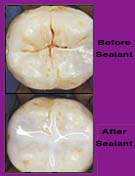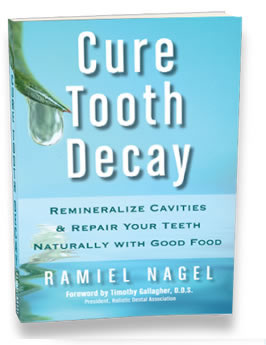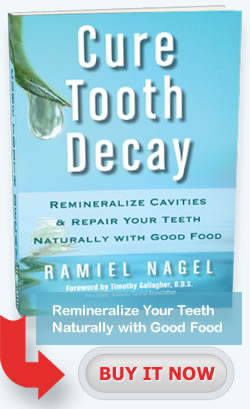Dental Sealants
Dental Sealants are a plastic or synthetic coating placed on your tooth surface which are designed to "prevent dental decay." Are they safe or effective?
Dental Sealants
 |
Before
After |
The claim is that, "Sealants can provide 100% protection from dental decay or "cavities" on the chewing surface."
If this were true, then everybody could just get a dental sealant and nobody would have cavities. I wish it were that simple. But this idea is simply not accurate.
Steps For Applying a Sealant
- Burn away some tooth with acid
- Paint the liquid sealant on your tooth
- Dry the sealant with UV light
I could not find clear evidence as to how long sealants last. How long a dental sealant lasts depends on the individual, and the material used. In some cases they last as little as one year, and in others longer than 15 years.
Where do you think they go when they dissolve and wear out?
Dental Sealants Are Not A Long Term Treatment for Tooth Decay, because they don't address the cause.
Our teeth are vital and alive. Putting chemicals on top of them to seal of the dentinal tubules hides tooth decay, but does not cure it. Dental sealants cannot stop tooth decay, but can only treat one of its symptoms temporarily, a hole in the tooth. The reason for this has to do with the dentinal fluid transport mechanism of tooth decay. Tooth decay is caused by a deficiency of nutrients caused the tooth bone to become less dense. The loss of density leads to the susceptibility of teeth to cavities. The famous dentist W.D. Miller explains that strong teeth protect against decay.
“These experiments show, among other things to what extent the resistance which the tooth opposes to the destroying factors depends upon the structure; further, it furnishes an answer to the question why all teeth under the same conditions do not become decayed in the same degree. A tooth of sound structure, protected by sound enamel, will resist the action of an acid for many years, whereas a soft, imperfectly developed tooth under the same conditions would show decay in the course of a few weeks.” (1890 in his book “The Microorganisms of the Human Mouth)
If, on the crown of the tooth there is some decay, and the nerve is more exposed, then applying a dental sealant only covers up the decay. But it won't ever stop it, because decay primarily happens from within the tooth. While dental science may strive to petrify or freeze a tooth to make it appear decay free with chemicals. This is not a type of treatment modality that I personally want, and will be unknown consequences if it is looked into more carefully.
The cause of tooth decay is a deficiency of bone building nutrients.
Dental Sealant Safety
As you know, dental sealants are toxic and made with toxic chemicals. There are many varieties of sealants, some less or more toxic than others. Some may have a very low toxicity and not be of harm to humans. But overall, currently used dental sealants are somewhat toxic, and they are likely to have some effect on humans because they contain moderate amounts of a chemical used in the plastic industry called bisphenol A.
Bisphenol A - And Dental Sealants
The plastics industry and the FDA say this chemical is perfectly safe and non-toxic in the amounts we consume. Meanwhile sane scientists are raising the alarm about the effects of even minuscule amounts of this endocrine disrupting substance, on reproduction, fetal development, cancer of the reproductive organs, and other long term health effects.
Endocrine disruptors are a class of substances that bond onto the estrogen receptors in both men, women and children.
Other dental sealants, promoted as calcium hydroxide sealants, are in fact only about 50% calcium hydroxide. These dental sealants have been linked to Neurocutaneous syndrome (NCS). NCS is characterized by neurological sensations, pain, depleted energy and memory loss as well as itchy cutaneous lesions that may invite various opportunistic infections. NCS is likely caused by two other main ingredients in some dental sealants both known to be toxic; ethyltoluene sulfonamide as well as zinc oxide are considered most toxic. Read the full report: Dental Sealant Toxicity (PDF).
Dental Sealants and Scientific Literature
A majority of scientific literature has a Bias towards the promotion of dental sealants. Therefore it is hard to obtain clear evidence on their true success rates because a careful analysis of the survey data or studies might provide different results.
Study: Bias in dental research can lead to inappropriate treatment selection.
Dentists are somewhat behind their medical colleagues in using the strongest research designs to answer clinical questions. In dentistry, observational studies with convenience samples of patients have been commonly used.
Source: Dent Clin North Am. 2002 Jan;46(1):61-78.
Jacob RF.
Commentary: Many studies showing the effectiveness of dental sealants are not looking deeply into the issue, but rather just looking at whether the sealed surface has a visible lesion. The deeper issue is the demineralization causes tooth decay.
Study: Estrogenicity of resin-based composites and sealants used in dentistry.
The use of bis-GMA-based resins in dentistry, and particularly the use of sealants in children, appears to contribute to human exposure to xenoestrogens.
Source: Environ Health Perspect. 1996 March; 104(3): 298–305.
Commentary: Dental sealants are toxic, and their toxicity varies based on the material used.
Study: The Effectiveness of Pit and Fissure Sealants
Similarly, the median complete retention declines from 92 percent after one year to 66 percent after seven years. Conversely, the median percent of sealed first molars becoming carious and/or restored increases from 4 percent after one year to 31 percent after seven years. Large differences in sealant effectiveness are not apparent between studies performed in fluoridated and fluoride-deficient communities.
Source: Journal of Public Health Dentistry
Volume 49, Issue 5, pages 317–330, December 1989
Commentary: This study like most dental studies on sealants have a strong bias. But it still shows that the effectiveness of sealants decrease significantly over time.
Study: Pit and fissure sealants for preventing dental decay in the permanent teeth of children and adolescents
Although pit and fissure sealants are effective in preventing caries, their efficacy may be related to the caries prevalence in the population.
Source: Cochrane Oral Health Group
Commentary: The abstract contains conflicting statements about sealants.
Additional source for this article: Conversation with a holistic dentist regarding dental sealants.
The Upside of Dental Sealants
While dental sealants do not cure cavities. They certainly hide the effects of demineralization from the dentist. Which means your teeth are less likely to be drilled. Since most dental drilling is unnecessary. Dental sealants provide an unexpected benefit. Although I wouldn't use them or recommend their use personally.

The practical advice in this book really seems to be reversing my tooth decay!!! Halleleuiah brother!!! I bought the book for $28... What a bargain, The dental work was going to cost well over $4,000.00 Think I'm excited, you will be too if you use this info to take tooth health into your own hands! Very satisfied. - Mike in Ashland, Oregon.

This book is a must read for everyone interested in improving their health. - Pam Killeen, NY Times bestselling author
I had several very painful cavities postpartum (after having twins) that kept me up all night in pain and made it so I could barely eat... After following the advice in this book accurately my tooth pain subsided within 24 hours and no longer hurt at all, my teeth also look nicer and my gums no longer bleed and are a nice pink color. - J. Steuernol, Canada
AWESOME, AWESOME, AWESOME. - Jackie
Fabulous book! I work in a health food store and will be recommending it a lot. - Vimala
I purchased your cure tooth decay book and appreciate all the info that has opened my eyes to this nutritional healing. - Ace
[Cure Tooth Decay] is a vehicle towards a higher good. It changes your perception of reality. It changes the reality. - Ranko Medved, Croatia


